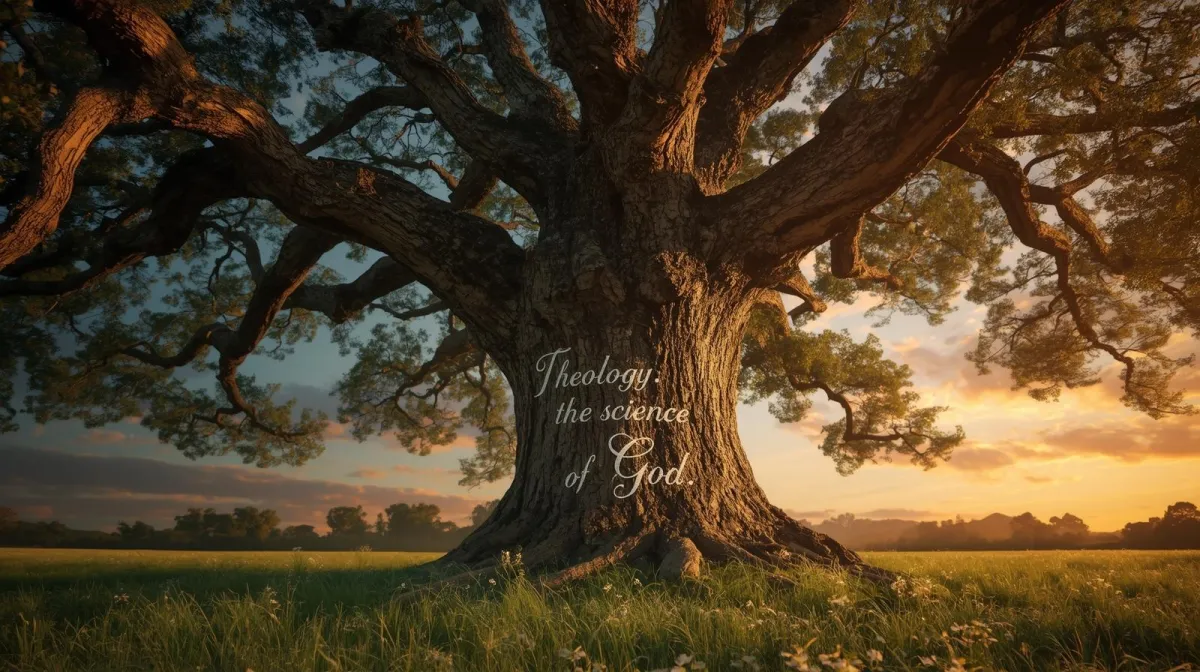WELCOME!
Thank you for contributing to biblical research!
Dive into a world of captivating narratives that transport you to a deeper understanding of the Lord, Jesus Christ. Learning about Christ involves biblical, theological, and practical research; these are essential areas for believers to study to grow in spiritual maturity.

Summary of Theological Disciplines
Has there ever been a time when an individual explained their field of study to another person? One example of this can be a lawyer explaining to a student how the law works. Or a chemist would explain to others the necessities of his field. In the same vein, believers, ministers, and all Christians can pursue theology not just for study, but to engage in theology daily. Grenz and Olson invite readers to gain a deeper understanding of the Lord through Who Needs Theology?: An Invitation to the Study of God. This essay will discuss different theological terms, as well as Grenz and Olson’s approach to the theological method. Theological method can be explored by discussing general terms, examining explicit terms in detail, and understanding theological methods through conversations with authors.
The theological method can be understood by examining general terms. The first term is to solidify understanding of the definition of theology. The Oxford Dictionary of the Christian Church displays a definition for this word: “the ‘science of God.’ Among the Greek Fathers, it comes to have two specific references: it can denote either the doctrine of the *Trinity (i.e., of God’s being, as opposed to his dealings with the created order), or it can mean prayer (as it is only in prayer that God is truly known).”[1] It is essential to observe that Oxford defines it as a science, either to indicate God’s attributes and or being. As well as prayer. Grenz and Olson describe another summary of theology. These authors pursue this definition in communicating the living beliefs of the Christian faith, as believers glorify the Lord.[2] Theology is to be lived out, and not merely knowledge that is lived out (Jas. 1:22).[3] Theology is pursued by many people throughout the world, yet an individual may never realize that theology is at play when conversing with the Lord and others. From these examples, it is essential to provide a definition that is clear and understandable. The suggested summary is that theology is learning from God about Himself in unique contexts. This framework can also be expressed through various art forms, including dance, theater, and artistry. This is critical, as other terms are defined within the context of studying the Lord. The next area defines different branches of theology.

The theological method can be found by discussing explicit terms in detail. The following term to be defined is systematic theology. This discipline relates to the study of doctrine and can be understood as the formation of a worldview within a specific subject. The Lexham Bible Dictionary defines systematic theology as a complete picture: “An approach to the Bible that seeks to draw biblical teachings and themes into a self-consistent, coherent whole, in conversation with the history of Christian theological reflection and contemporary issues confronting the church.”[4] This summary offers insight into the daily activities of a systematic theologian. These specific believers answer specific questions relating to problems such as abortion, murder, cultural issues, and other problems. Applications to core doctrines of the congregants in Jesus Christ are also placed in systematic theology. At the same time, theologians in this area may pursue reform within varying church contexts. This is critical as Christians need to have humility before God, adjusting, rebuking, and training others in God’s Word (2 Tim. 3:16). Even the Lord can bring the church to humility (Dan. 4:37b). Grenz and Olson present systematic theology this way, “…A scarlet thread that runs throughout all of the Christian doctrine. Theology becomes systematic using what we call its “integrative motif.”[5] This specific definition is commonly held within the church. Respectfully, this method of doing theology might consider different issues. Or maybe an expository theology of teaching.[6] A suggested definition is that systematic theology pertains to the matters of the church's teachings and problems in the ultimate sense. Terms need to be understood; the following section deals with biblical theology.
Biblical theology differs in that it has specific parameters that justify this discipline. The Oxford Dictionary of the Christian Church describes biblical theology as part of doctrinal treaties, “the former being the non-dogmatic description of the religious doctrines contained in the Bible.”[7] This is crucial to understand, particularly when interpreting this field. One example is the doctrine of the New Covenant. This is found explicitly in the Bible. Before the New Covenant, there was the Old Covenant. God comes to Abram to promise him a nation, even though at the time he did not have a son, he has faith, and is credited towards righteousness (Gen. 15, 15:6). The prophet Jeremiah, indwelled by the Holy Spirit, discusses the implication of God’s new covenant, as His law is written on their hearts (Jer. 31:31-34, 33). God, in His riches and mercy, made the Old Covenant obsolete, which will grow old and vanish away. Yet, Jesus Christ is the mediator of this New Covenant (Heb. 8:13, 9:15). This is important as believers believe in Jesus Christ so that none shall perish, but have everlasting life (Jn. 3:16). This brief example is what is pursued in biblical theology. A suggested summary of this area of study is that biblical theology responds to and communicates issues within the properties of the Bible. The final term that needs to be understood is historical theology.
The subject of learning about figures, controversies, heresies, and issues is essential in the unique discipline of theology. The New Dictionary, Historical and Systematic exemplifies a summary of this prestigious field, “Even the earliest bishops and teachers refer to the apostolic writings of the NT. But it was only with the development of the historical-critical method in the nineteenth century that historical theology developed as a distinct discipline.”[8] Currently, the writer of this paper has taken a class in this subject, Seminar in the History and Theology of the Middle Ages. This specific class examines church history from 500 to 1500 AD. While this discipline may appear to address only history, historical theology draws from historical information to address issues that are both inside and outside the church. One example of this is that believers may look to and glean from the Reformation, addressing problems that may be similar, to find a solution. This methodology happens similarly when applying biblical truths in God’s Word. The church at Ephesus at the end of the first century was struggling with losing its first love for Jesus Christ (Rev. 2:1-7, 4). There have been times I have had a difficult time loving my Lord first. I praise the Lord that He forgives in such cases (1 Jn. 1:9). This similar methodology can also be applied when describing distinct aspects of history. A suggested definition of this area of study is that historical theology responds to the Lord’s revelation throughout history. Throughout the discussion of these terms, all these fields are essential when studying theology. The last reason discusses Grenz and Olson’s work on the theological method.
Theological method can be explored by examining the approaches of various authors. The title of Grenz and Olsen’s work initiates the discussion of their thesis, "Who Needs Theology?": An Invitation to the Study of God. The author’s thesis invites Christians to recognize that believers are already engaging in theology. This is unique, as the theological world reaches Christians not just in academics, but also in everyday life, encapsulating the fact that theology is practiced all the time, with or without classrooms or institutions. The writers provide detailed descriptions of the different levels of theology and the various levels of individuals on the spectrum.[9] Furthermore, after introducing, defining, and defending theology (as described in the first reason), the writers pursue applicable steps for living out theology.[10] The remaining chapters encourage the reader to develop a theological method, specifically in relation to theology’s tasks, its chest of tools, systematic theology, and living out theology as believers follow Jesus Christ.[11] This method of theological inquiry is essential at its core. Similarly, Christians are called to be doers of the word, not just hearers, as believers experience God through theology (Jas 1:22). A suggestion to add to this book is to increase the content of historical theology. This work is excellent in its comprehension of theology, systematic theology, and the practical application of God's study. Yet with gentleness and respect, there is not enough emphasis on history. The concluding argument concludes by highlighting the needs and contributions of theology in the church and the academy, as it involves asking and pursuing questions about God and the world; therefore, it is beneficial for Christians.[12] This renders the suggestion on historical theology somewhat invalid, yet it now falls to personal preference. This would round out this work. The authors have accomplished their thesis throughout this entire book. The writer of this essay has come to understand new things about God and the nature of theology, such as natural theology. This term is beyond the scope of this paper. Through an understanding of these terms, the author has developed a comprehensive theological method.
In conclusion, theological methods can be explored by discussing general terms, examining explicit terms in detail, and drawing on theological methods through conversations with authors. This is critical as believers respond to God’s revelation. Even as far as to say that it is good to be aware of this study, primarily for those who believe in the Lord. The call to action is to study the Bible and theology in greater depth.
Bibliography
Barry, John D., David Bomar, Derek R. Brown, Rachel Klippenstein, Douglas Mangum, Carrie Sinclair Wolcott, Lazarus Wentz, Elliot Ritzema, and Wendy Widder, eds. “Systematic Theology.” In The Lexham Bible Dictionary. Bellingham, WA: Lexham Press, 2016.
Cross, F. L., and Elizabeth A. Livingstone, eds. “Theology.” In The Oxford Dictionary of the Christian Church. Oxford; New York: Oxford University Press, 2005.
Grenz, Stanley J, and Roger E Olson. Who Needs Theology?: An Invitation to the Study of God. Downers Grove, Ill., USA: InterVarsity Press, 1996.
Noble, T. A. “Historical Theology.” Edited by Martin Davie, Tim Grass, Stephen R. Holmes, John McDowell, and T. A. Noble. New Dictionary of Theology: Historical and Systematic. London; Downers Grove, IL: Inter-Varsity Press; InterVarsity Press, 2016.
[1] F. L. Cross and Elizabeth A. Livingstone, eds. “Theology,” In The Oxford Dictionary of the Christian Church (Oxford; New York: Oxford University Press, 2005), 1616.
[2] taTanle. Grenz and Roger E. Olson. Who Needs Theology?: An Invitation to the Study of God (Downers Grove, Ill., USA: InterVarsity Press, 1996), 49.
[3] Unless otherwise noted, all Scripture is in the English Standard Version.
[4] John D. Barry et al., eds., “Systematic Theology,” In The Lexham Bible Dictionary (Bellingham, WA: Lexham Press, 2016).
[5] Grenz and Olson, 115.
[6] For a good example of this, see Grenz and Olson, 116-118.
[7] Cross and Livingstone, eds. “Biblical Theology,” In The Oxford Dictionary of the Christian Church (Oxford; New York: Oxford University Press, 2005), 207.
[8] T. A. Noble, “Historical Theology,” In ed. Martin Davie et al., New Dictionary of Theology: Historical and Systematic (London; Downers Grove, IL: Inter-Varsity Press; InterVarsity Press, 2016), 413.
[9] Grenz and Olson, 12-35.
[10] Grenz and Olson, 36-67.
[11] Grenz and Olson, 68-148
[12] Grenz and Olson, 148.

